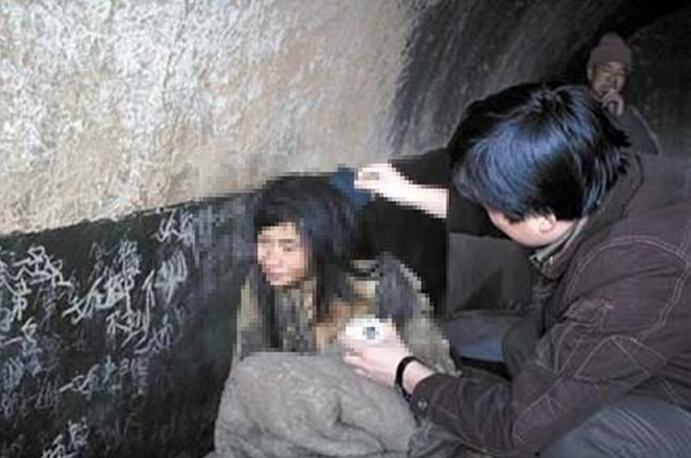Grim facts of life behind human trafficking ring
china.org.cn / chinagate.cn by Chen Xia, October 30, 2015 Adjust font size:
Some mentally challenged women in China's poverty-stricken areas have fallen prey to criminals. They have been smuggled to places far from home, kept in captivity in a hog farm, forced to marry local men and ended up as a "son-bearing machine".
Recently, a human trafficking ring was busted in south China's Guangxi Zhuang Autonomous Region arousing public outrage.
On Feb. 8, 2015, policemen found a woman suffering from obvious mental disorder on a train departing from Nanning, capital of Guangxi. The woman was being followed by two men who immediately aroused police suspicions.
|
|
| A smuggled woman was rescued by police. [File photo] |
After inquiry, police found the two had bought the woman from a smuggler in Guangxi and were going to sell her in Shandong Province more than 1,000 kilometers away in east China.
Further investigation uncovered a criminal ring smuggling mentally-ill women from Guangxi and neighboring Guangdong Province and selling them to unmarried men in Shandong Province. In the past two years, the ring had sold 10 women and earned more than 600,000 yuan (US$94,500).
To avoid being noticed, a member of the ring opened a hog farm in Shandong to keep the smuggled women in captivity. The buyers had to pick up their "goods" at the farm. Most were single men over the average marriage age. Coming from remote mountainous areas, they were unable to find wives due to poverty and resorted to smugglers to find someone to bear sons for them.
Police said the gang deliberately chose the mentally-ill as such women would be unable to defend themselves, and their families sometimes saw them as a burden and wanted to get rid of them. "I told the women's families that I found good husbands, and their families never bothered to check if it was true," said a smuggler in Guangxi. "Their families were simply happy to send them away."
The smugglers always gave the women's families a "bride price" ranging between 3,000 yuan (US$472.5) to 5,000 yuan (US$787.5). When the women were taken away, their families never bothered to contact them, let alone to alert the police. Therefore, it was difficult for the latter to obtain evidence.
When the women were sold in Shandong, they were treated badly, but were unable to seek help. One of the victims was sold twice before police rescued her. Most of the buyers were in backward areas with poor legal awareness. Many people in these areas even didn't know such behavior was against the law.
And the reaction of the women's families was no better. When the police sent one victim back home after rescuing her, her family refused to take her in, claiming they were "too poor to support her." They accepted her only after the local villagers committee promised to provide a subsidy.
After the criminal ring was broken up, the protection of mentally-ill women captured great public attention.
For example, Wu Yongming, vice chairman of the Jiangxi Provincial Academy of Social Sciences, said that, despite the recent amendment in the Criminal Law that strengthened efforts to crackdown on the trafficking of women and children, the government needed to further clarify the duties of guardians of mentally-ill women and enhance local governments' role in safeguarding their interests,.
According to Li Lanying, professor of law at Xiamen University, in southeast China's Fujian Province, smuggling mentally challenged women was not only a criminal offence, but also a serious offence against public morality.
She called on the authorities to introduce more legal methods to improve the protection of such women, and impose harsher punishment on those who harm their interests.
